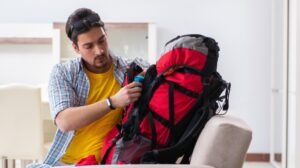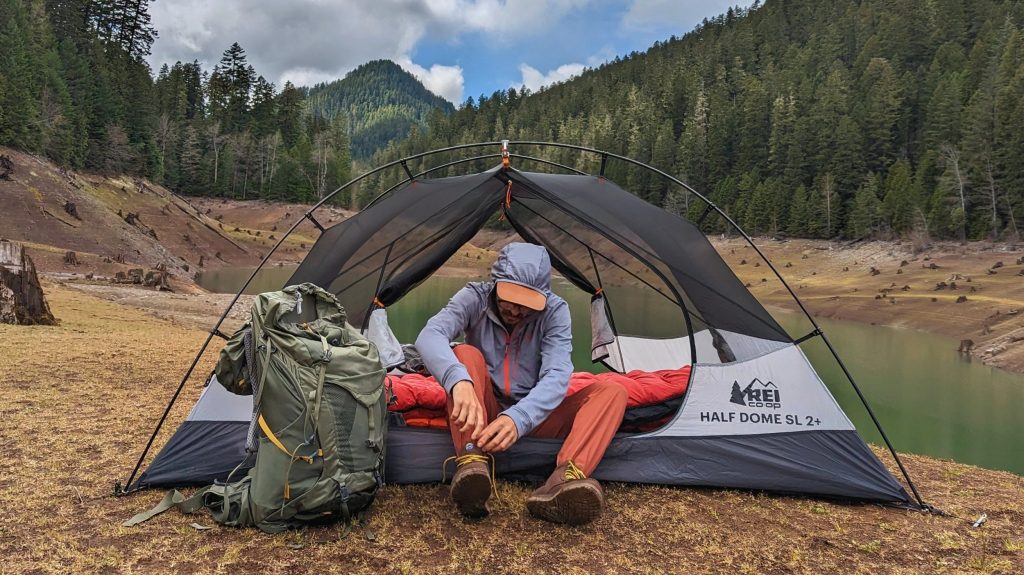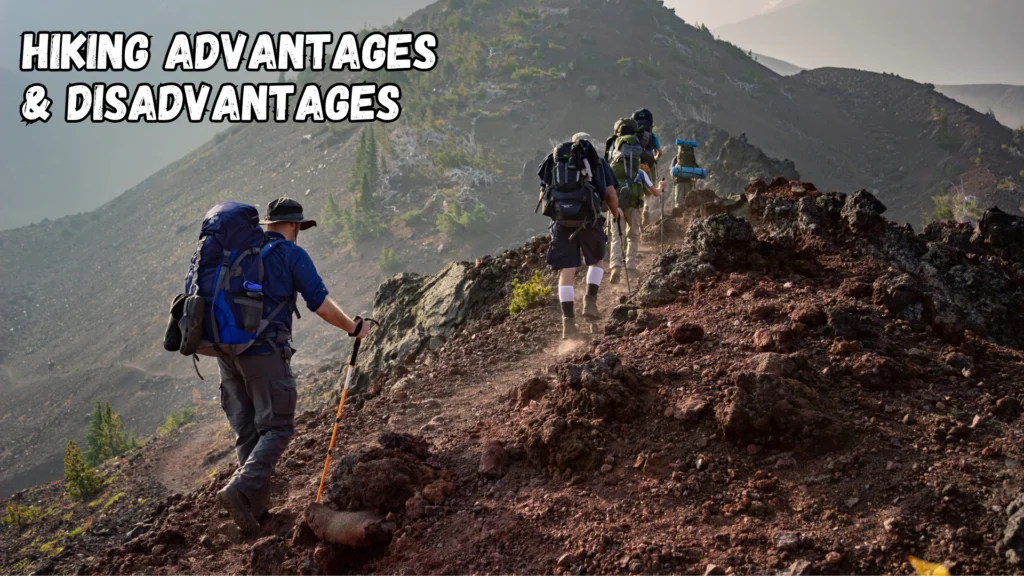Backpacking on a budget is often a priority for travelers. Fortunately, with the right strategies, you can have an incredible adventure without spending a fortune. Whether you’re a seasoned backpacker or new to budget travel, these 21 tips will help you explore new destinations affordably.
Fortunately, with the right strategies, it’s possible to have an incredible adventure without breaking the bank. Whether you’re a seasoned backpacker or new to the concept, these 21 tips will help you make the most of your budget while exploring new destinations.
From finding affordable accommodation options to saving money on transportation, food, and activities, these tips cover all aspects of budget backpacking. So, if you’re ready to dive into the world of low-cost travel and experience unforgettable adventures, keep reading for some essential tips and tricks.
1. Choose the Right Gear
Choosing the right gear is crucial for successful budget backpacking, as it directly impacts your comfort, mobility, and expenses throughout your journey. Lightweight, durable equipment helps reduce the strain on your body while moving from place to place, allowing you to travel further without fatigue. Additionally, selecting gear that is versatile and multi-purpose saves both space in your backpack and money, as you won’t need to purchase multiple specialized items. Prioritize quality essentials like a sturdy backpack, weather-resistant clothing, and a compact sleeping bag. Investing in durable, long-lasting gear also prevents frequent replacements, ultimately saving you money in the long run.
For more information on selecting the best gear, check out our guide to backpacking gear essentials, where we break down must-have items for any adventure.
2. Research Lightweight Options
Shop for compact and lightweight gear to reduce strain on your back and make travel easier.
3. Invest in Multi-use Items
Select items that serve multiple functions. This will save space in your backpack and reduce costs since you won’t need to buy as much gear.

Budget-friendly Accommodation
Explore our 21 budget-friendly tips for backpacking on a budget, including strategies for affordable accommodation options. Discover how you can stretch your travel budget without compromising on comfort or experiences.
4. Camping in Free or Low-Cost Sites
Find free or low-cost camping sites. Many national parks, forests, and rural areas offer affordable or free camping options.
5. Utilize Hostels and Guesthouses
Hostels and guesthouses offer affordable accommodations; perfect for budget-conscious travelers.
Economical Food And Drink Options
When backpacking on a budget, one of the biggest areas where you can save money is on food and drink. By being smart about your meal planning and cooking, as well as finding local markets and grocery stores, you can enjoy delicious and economical meals without breaking the bank.
6. Plan and Cook Your Meals
Cooking your own meals is not only more cost-effective but also gives you control over your diet. Simple and hearty dishes can be easily prepared with limited resources.
7. Find Local Markets and Grocery Stores
Local markets and grocery stores offer fresh produce and snacks at lower prices than touristy restaurants. Exploring these places also gives you a taste of the local culture. When you’re traveling to a new destination, take the time to explore local markets and grocery stores. You’ll find a variety of fresh produce, snacks, and other food items at lower prices compared to tourist-oriented restaurants and convenience stores. Take advantage of the chance to experience local cuisine and stock up on supplies for your own meals.
Transportation Strategies
Discover 21 savvy transportation strategies for backpacking on a budget. From utilizing public transport to carpooling with fellow travelers, these tips allow you to explore the world affordably and sustainably. And we all know that transportation can be one of the most expensive aspects of traveling, but with some planning, you can cut costs. Look for multi-day public transport passes or consider ride-sharing options. BlaBlaCar is a great platform for finding budget-friendly carpooling options across Europe.
8. Optimize Public Transportation
Transportation can often be a significant expense when backpacking on a budget. However, there are several strategies you can use to optimize your use of public transportation and save money without compromising on your travel experience. When it comes to public transportation, research is key. Look for local transportation options like buses, trams, and trains that are cheaper than taxis or private transfers. Most cities have reliable and efficient public transportation systems that can take you to popular tourist destinations at a fraction of the cost. Pro Tip: Save even more money by purchasing multi-day or weekly passes, which often offer unlimited travel within a designated period. This can be especially beneficial if you plan on staying in one place for an extended period. Additionally, consider using apps or websites that provide real-time information on public transportation schedules and routes. This will help you plan your journeys effectively and avoid unnecessary waiting times. Apps like Google Maps or city-specific transportation apps can be invaluable resources for navigating unfamiliar cities.
9. Share Rides with Other Travelers
Another great way to save money on transportation is by sharing rides with other travelers. This not only reduces the cost per person but also provides an opportunity to meet new people and potentially make lasting connections. Platforms like BlaBlaCar, Grab, or UberPOOL allow you to share rides with other travelers going in the same direction. By splitting the fare, you can significantly cut down on transportation expenses, especially for long-distance journeys or when public transportation options are limited. Pro Tip: It’s important to exercise caution and use trusted platforms when sharing rides with strangers. Look for verified drivers and read reviews from previous passengers to ensure your safety and a positive experience. In addition to cost savings, ride-sharing can also be more flexible and convenient than traditional public transportation, as you have more control over pick-up and drop-off locations. It’s a win-win situation, allowing you to reduce expenses while adding some social interaction to your backpacking adventure.
| Benefits of Sharing Rides |
|---|
| Cost savings on transportation expenses |
| Potential to make new friends and connections |
| Flexibility and convenience in pick-up and drop-off locations |
10. Walk or Bike Whenever Possible
Walking or renting a bike is a great way to explore cities without spending money on transportation. It also gives you a chance to see hidden gems that public transport may bypass.
Remember, wise transportation choices can free up more of your budget for other memorable experiences during your backpacking trip. So optimize public transportation and explore ride-sharing options to enjoy budget-friendly travel without compromising on adventure.
Money-saving Tips For Attractions
When backpacking on a budget, saving money on attractions is essential. With these money-saving tips, you can make the most of your travel experience without breaking the bank. Here are some valuable strategies to help you enjoy attractions without overspending. Many cities offer discount cards or passes for attractions and public transport. Before you travel, research whether your destination has a CityPASS or similar program, which can save you money on entrance fees to top tourist spots.
11. Take Advantage of Free Attractions
Many destinations offer free attractions that can provide an enriching experience without costing a dime. Research your destination beforehand to find museums, parks, historic sites, and cultural events that are open to the public at no charge. To further maximize your savings, consider exploring local hiking trails, beaches, and markets that offer natural beauty and cultural immersion without an entrance fee.
12. Use Discount Cards or City Passes
Investing in discount cards or city passes can be a savvy way to save money on attractions. These cards often provide access to multiple attractions at a discounted rate or even for free. Look for options that cater to sightseeing tours, public transportation, and popular landmarks to make the most of your budget. Research thoroughly and compare different cards to find the one that offers the best value for the attractions you plan to visit.
Health And Safety Measures
When embarking on a backpacking adventure, your health and safety should be a top priority. Taking necessary precautions can ensure a smooth and enjoyable journey. Here are two essential health and safety measures to consider:
13. Carry a Basic First-Aid Kit
Accidents and illnesses can occur unexpectedly when you’re on the road. It’s essential to have a basic first-aid kit with you at all times. Here’s a checklist of items to include:
| First-Aid Kit Essentials |
|---|
| Adhesive bandages (various sizes) |
| Antiseptic wipes or liquid |
| Gauze pads and adhesive tape |
| Tweezers |
| Scissors |
| Pain-relieving medication (e.g., ibuprofen) |
| Allergy medication (e.g., antihistamines) |
| Antibiotic ointment |
| Medical gloves |
Remember, this is just a basic kit. You can customize it based on your specific needs and any specific activities you plan to engage in during your backpacking trip.
14. Get Travel Insurance
Travel insurance is essential for covering accidents, medical emergencies, trip cancellations, and lost luggage. Research policies that fit your budget and cover your activities.
Being Aware Of Travel Insurance Options
While it’s always best to prioritize safety, it’s also crucial to be prepared for unforeseen circumstances. One way to do this is by getting travel insurance. This protects you financially in case of accidents, medical emergencies, trip cancellations, or lost luggage. Here are some important factors to consider when researching travel insurance options:
- Medical coverage: Ensure the policy covers medical expenses, including hospitalization and emergency evacuation.
- Cancellation coverage: Look for a policy that provides reimbursement in case you need to cancel or cut short your trip due to unforeseen circumstances.
- Luggage coverage: Check if the insurance covers lost or stolen luggage and personal belongings.
- Adventure activities: If you plan to engage in adventure sports or other high-risk activities, make sure your policy includes coverage for those.
- 24/7 emergency assistance: Confirm if the insurance provides round-the-clock helpline for emergencies.
Research and compare different travel insurance options to find the one that suits your budget and meets your specific needs. Remember to read the policy carefully and understand the coverage and exclusions.
Minimizing Extra Expenses
Minimizing extra expenses is key to keeping your backpacking trip affordable. Start by avoiding unnecessary purchases like souvenirs, which can quickly add up and take up valuable space in your backpack. Instead, focus on experiences and memories. Additionally, make use of free Wi-Fi in cafes, hostels, and public places to avoid costly data roaming charges. Take advantage of free or low-cost activities, such as hiking, exploring local markets, and attending free cultural events. By being mindful of small costs and choosing budget-friendly options, you can save money without compromising the quality of your travel experience.
15. Avoid Unnecessary Souvenirs
While it’s tempting to buy souvenirs, they can quickly add up. Focus on experiences rather than material items.
16. Use Free Wi-Fi Instead of Data Roaming
Wi-Fi is available in most hostels, cafes, and public places. Avoid costly data charges by using Wi-Fi to stay connected.
Cultural Immersion Without Cost
Embark on a budget adventure with these 21 backpacking tips to immerse yourself in diverse cultures without breaking the bank. Experience local lifestyles, cuisine, and traditions for a truly enriching journey without the added cost. Get ready to explore and learn through authentic cultural encounters on your next budget-friendly trip.
17. Attend Free Local Events
Immersing yourself in the culture of a new destination doesn’t have to come at a high cost. Countless free local events around the world offer a window into the traditions, customs, and lifestyles of a place. By attending these events, you can experience the vibrant spirit of a community without putting a strain on your budget. One way to discover free local events is by researching community calendars, which are often available online or in local newspapers. These calendars provide a comprehensive overview of upcoming festivals, fairs, concerts, and other activities that are open to the public at no cost. Attending these events not only allows you to witness traditional music, dance, and cuisine but also allows you to connect with locals and fellow travelers who share your love for cultural immersion.
Another way to engage in free local events is by simply walking around the city and keeping an eye out for flyers, posters, or announcements. Many cities have street festivals, open-air markets, or parades that offer an authentic taste of the local culture. Taking part in these events not only allows you to have a memorable experience, but also helps support the local economy and fosters a sense of community.
18. Participate in Language Exchange Programs
Language exchange programs provide an excellent opportunity to immerse yourself in the local culture and connect with locals on a deeper level. These programs allow you to brush up on your language skills while interacting with native speakers who can provide insights into their culture, history, and way of life. To find language exchange programs, you can start by contacting local universities, language schools, or community centres in your destination. Many of these organizations organize language exchange events, where you can meet locals who are interested in practicing their foreign language skills with native speakers. These events often take the form of casual conversations or structured language lessons, where you can not only improve your language skills but also forge meaningful connections with locals. Apart from organized language exchange programs, you can also make use of language learning apps or websites that connect language learners around the world. These platforms allow you to find language partners who are interested in exchanging their language skills.
By connecting with a local person through these online platforms, you can arrange meetups to practice the language, explore the city together, and gain a deeper understanding of the local culture. In conclusion, experiencing cultural immersion without breaking the bank is completely achievable. By engaging in free local events and participating in language exchange programs, you can delve into the cultural richness of a destination without incurring significant expenses. So, be sure to seize these opportunities and unlock a whole new level of connection and understanding during your backpacking adventure.

Credit: www.cleverhiker.com
19. Explore Local Hiking Trails and Beaches
Nature is often free! Many destinations have beautiful hiking trails or beaches that don’t require entrance fees. This allows you to enjoy the outdoors without spending money.
Stay Within Your Budget
Sticking to a budget is essential when backpacking on a budget. Before you set out on your trip, plan a daily budget that covers your core expenses, including accommodation, food, and activities. Tracking your spending will help you stay within limits and avoid financial stress. It’s also wise to leave some flexibility for unexpected costs, like transportation delays or emergency purchases. Prioritize experiences that are meaningful to you and cut back on non-essential spending, such as costly souvenirs or dining at expensive restaurants. By managing your finances wisely, you can enjoy your trip without overspending.
20. Stick to a Daily Budget
Create a daily budget to track your expenses on food, accommodation, and activities. This will help you avoid overspending and ensure you stick to your financial plan.
21. Be Flexible with Your Travel Plans
Flexibility can save you money. Look for last-minute deals on transportation or accommodation and be open to changing your itinerary if a cheaper option arises.
Backpacking on a budget can be an incredibly rewarding experience, allowing you to see the world without breaking the bank. By following these 21 tips, you can make the most of your travels while staying within your budget. From packing light to embracing local culture, these tips will help you make the most of your backpacking adventure.
FAQs:
What Is The 20% Rule For Backpacking?
The 20% rule for backpacking suggests carrying a pack that’s no more than 20% of your body weight.
Is 50 Pounds Too Heavy For Backpacking?
Yes, 50 pounds is too heavy for backpacking. Keep your pack weight below 20% of your body weight for a comfortable trek. Opt for lightweight gear to reduce the load and enjoy a more pleasant hiking experience.
How Many Pounds Of Food Do I Need For A 5-Day Backpacking Trip?
For a 5-day backpacking trip, plan on carrying approximately 1. 5-2 pounds of food per person per day.
How Much Should You Budget For A Backpacking Trip?
Budgeting for a backpacking trip depends on your destination, duration, and travel style. On average, you can expect to spend $30-50 per day, but it can vary. Plan meticulously, and consider accommodation, food, transportation, activities, and visas. Building a moderate budget with some flexibility ensures an exciting and cost-effective experience.


